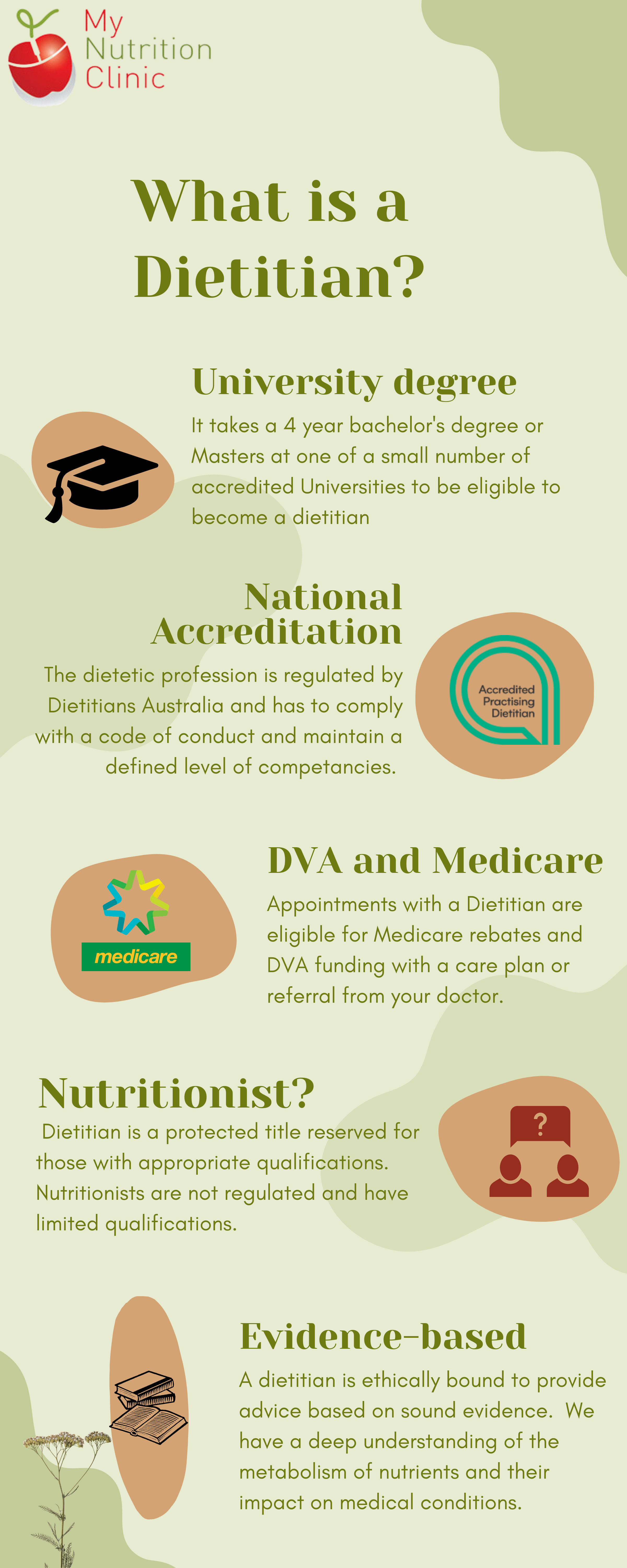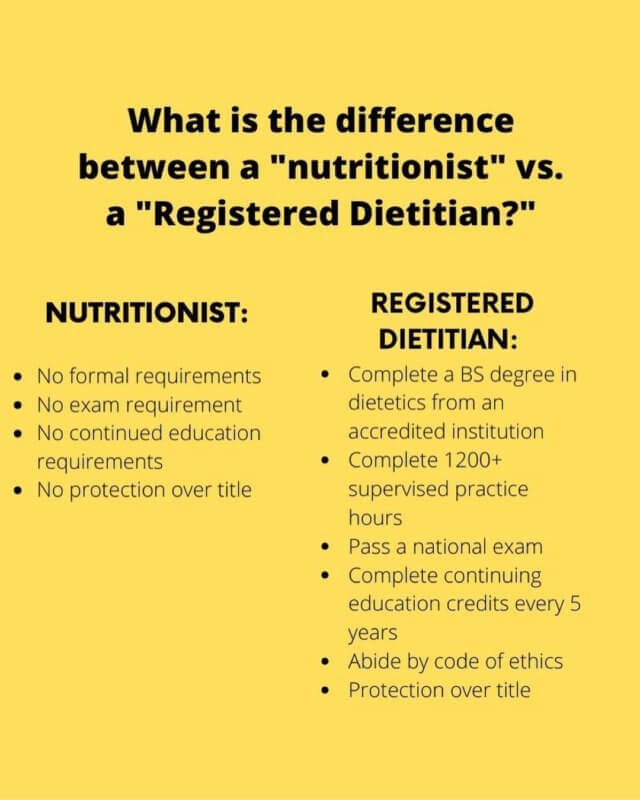All Categories
Featured
Table of Contents
-1
In the United States and lots of other countries, a dietitian is a board-certified food and nutrition expert. They are very enlightened in the field of nourishment and dietetics the scientific research of food, nourishment, and their influence on human health and wellness. Via comprehensive training, dietitians get the know-how to give evidence-based clinical nourishment therapy and nutritional counseling tailored to fulfill an individual's requirements.
-1To make these qualifications dietitians-to-be should initially gain a bachelor's level or comparable credit scores from an accredited program at a college or college. Typically, this calls for an undergraduate scientific research level, consisting of training courses in biology, microbiology, natural and not natural chemistry, biochemistry, composition, and physiology, as well as even more specialized nutrition coursework.
Nutritionist And Dietitian – Melville
-1This enables them to assess acute demands, focusing on deadly conditions. Inpatient and outpatient dietitians additionally give nourishment education to people with specialized needs, such as those newly out of surgical treatment, in cancer treatment, or detected with chronic ailments like diabetes or kidney illness. In the outpatient setup, they provide more extensive dietary therapy working in the direction of a nutrition-oriented goal.
-1They can additionally advocate for public laws with a concentrate on nutrition, food, and wellness issues. Study dietitians commonly function in study health centers, companies, or colleges. They operate within a research study team headed by a main investigator and accomplish nutrition-focused interventions. Once dietitians have made their qualifications and are operating in the field, they can go on to concentrate on a specific subcategory, such as pediatrics or sports dietetics.
-1They might in addition show in an academic or study organization or blog about nutrition-related topics. Others may work as wellness and nutrition specialists in media or as speakers. Dietitians are certified to handle nutrition therapy throughout a period of severe and chronic conditions. The kind of problems they treat depends most on the setting of their method.
Geriatric Nutritionist ( Melville)
-1In lots of states, such as Alaska, Florida, Illinois, Maryland, Massachusetts, and Pennsylvania, RDs and CNSs are approved the very same state license, normally called an Accredited Dietitian Nutritional Expert (LDN) permit. In states that do not regulate using this term, any individual with a rate of interest in diet regimen or nourishment might call themselves a nutritionist.
-1However, since uncredentialed nutritional experts usually lack the experience and training for clinical nourishment therapy and nourishment counseling, following their guidance might be taken into consideration unsafe (). Before consulting a nutritionist, you might intend to check whether your state controls that might use this title. In the united state states that do not manage the term, no levels or qualifications are called for to be a nutritional expert.

-1
In states that do mandate licensure, the CNS or RD credential might required. Those with CNS credentials are wellness professionals like registered nurses or doctors with advanced health degrees that have looked for extra coursework, finished supervised technique hours, and passed an examination managed by the Board for Qualification of Nutrition Specialists.
-1While a few of these techniques may have robust scientific backing, others may not. Offering nutrition recommendations without the proper expertise and training can be damaging, particularly when counseling those with health problems. If you are thinking about getting in touch with a nutritional expert, you might want to ask if they are a CNS or have state licensure or accreditation, or one more credential.
Consultant Dietitian
-1Several states specifically manage this term. In addition, nutritional experts might pursue an advanced CNS certification.
-1It can be testing to help individuals make authentic, lasting adjustments in their lives. Both dietitians and nutritionists provide an array of nutrition-based solutions to customers.
-1They should have completed some level of education in their field. They are additionally called for to have finished up to a year of monitored work, working within a led program at a medical care facility, providing company, or neighborhood body. Dietitians have far higher expectations positioned on their abilities and level of expertise.
-1This implies that there is no body that manages their qualifications and no especially stringent guidelines that nutritionists requirement to comply with in order to be able to practice. Dietitians, on the other hand, are signed up with nationally recognised bodies, such as the Dietitians Organization of Australia. They have to comply with the National Competency Criteria for Dietitians.
Certified Dietitian

-1
Nevertheless, you can exercise as a nutritionist without the very same level of accreditation as a dietitian. Nutritional expert programs can differ in length and high quality, with some as brief as 6 weeks and covering far much less material than a dietetics program. Depending on your education and learning service provider, you can gain a substantial amount of knowledge via examining a straightforward nutrition training course; nonetheless it is necessary to check out the course content before starting.
-1This can include attending market workshops or reviewing market publications. Nutritional experts, on the other hand, normally earn their qualifications in order to supplement other credentials and give better recommendations to their clients. Nutritional experts can obtain work in a wide variety of fields, including public wellness advice, recommendations for people, and working with personal organisations.
-1Nutritional experts can function with showing off organisations, health clubs, institutions and recommend media electrical outlets on standard terminology and right usage of terms. Dietitians can function in most of the exact same roles as nutritionists.
Plant-based Nutritionist – Murdoch 6150
-1Dietitians usually collaborate with even more clinically delicate customers. These can consist of those with diabetes mellitus, allergies, excessive weight, cancer and intestinal illness. Because of the high degree of expertise required to supply services to these people, only recognized dietitians are permitted to give care. Some of the greater degree duties with healthcare organizations can be extremely satisfying, and pay quite well.
-1In Australia there is a difference in between a dietitian and various other nutritional health suppliers including nutritional experts. All dietitians are nutritionists, yet nutritionists without a dietetics certification can not call themselves a dietitian. While there are resemblances between a dietitian and nutritional expert there are distinctions in certifications and policy. The dietetic occupation is controlled and meets rigorous criteria as laid out by the National Partnership of Self Regulating Health Professions (NASRHP).
-1Dietitians with the Accredited Practising Dietitian (APD) credential commit to ongoing training and education and learning throughout their occupations. They stick to our code of conduct. Dietitians have the expertise and skills discovered in the National Expertise Requirements for Dietitians. As an occupation, nutritional experts are not managed in Australia under NASRHP or certified under a single regulatory body.
Best Dietitian For Weight Loss – Murdoch 6150
-1If you have a chronic wellness condition and a care strategy from your general practitioner, you might be able to declare a Medicare refund when you see an APD. Discover more regarding aid with expenses when seeing a dietitian. The primary purpose of individuals operating in the profession of dietetics is symbolized in this declaration: The career of dietetics adds to the promo of health and the avoidance and treatment of disease by optimising the nourishment of populaces, communities and individuals.
Latest Posts
Home 2
Plant-based Dairy- Health Or Hype? – Darling Downs
How To Know If You Or Someone You Care About Has An ... (Dayton )